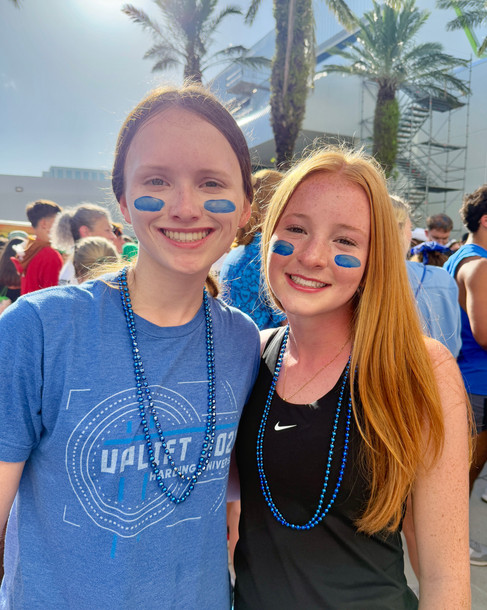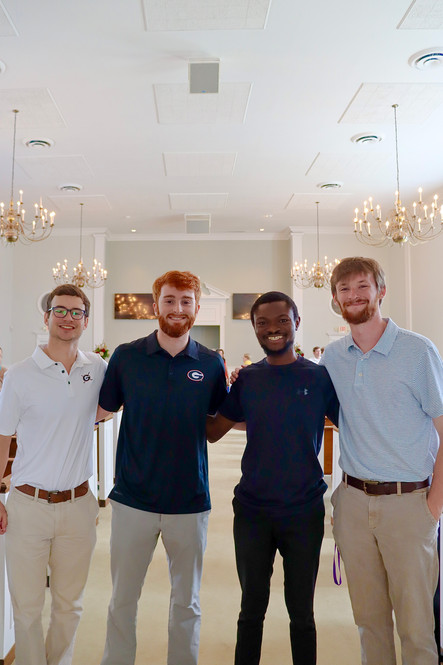- rciarra2004
- Jul 21, 2025
- 3 min read
Updated: Jul 28, 2025
Throughout my internship at Campus View Church, I’ve gained a clearer understanding of my personal strengths and areas where growth is still needed, especially in the context of professional communication and ministry work. One of my biggest strengths has been my ability to write clearly, concisely, and with an intentional voice that matches the tone of the church. Whether I’m drafting social media captions, writing newsletter blurbs, or creating visual content, I’ve felt confident in my ability to communicate messages that are both informative and engaging. I’ve also found strength in stakeholder engagement—particularly in learning how to connect with our different audiences through tailored messages and media formats.
Another strength has been my adaptability in using communication tools like Canva, Adobe Photoshop, Lightroom and InDesign as well and Instagram’s content management features. My comfort with digital platforms has helped me take initiative in content creation, meet deadlines, and offer creative solutions when challenges arise. In terms of team collaboration, I’ve learned to ask thoughtful questions, stay organized, and communicate updates clearly with my supervisor and ministry leaders. These habits have made me a reliable part of the team and helped build trust among staff members.
At the same time, this experience has revealed some key areas I need to improve on. One is in analyzing communication metrics and using that data to drive future strategy. While I can read engagement reports, I want to become more confident in interpreting them and understanding trends over time. I’ve also realized that I need more experience in public speaking and presenting ideas to a group. While it hasn’t been a major requirement of this internship, I know it’s a skill I’ll need in future roles—especially when leading projects or presenting communication plans. Additionally, while I’ve gained industry understanding in the nonprofit and faith-based communication world, I still have a lot to learn about long-term content strategy, campaign planning, and how to align messaging with organizational growth goals.
Looking ahead to future professional opportunities, I now understand that classroom knowledge must be paired with real-world experience. My courses provided a strong foundation, especially in writing, branding, and media design, but I need to actively seek out opportunities to apply that learning in new settings. To better prepare myself for the next step—whether that’s another internship or a full-time job—I plan to develop stronger data literacy, study best practices in digital communication across industries, and build a personal portfolio of work that demonstrates both creativity and strategy.
One of the biggest takeaways from this position is that communication is most powerful when it builds community. In a church setting, the goal isn’t just to inform—it’s to invite, uplift, and connect people with each other and with something greater than themselves. I’ve learned that authenticity, consistency, and intentional design can help foster that connection in subtle but impactful ways. This understanding has deepened my appreciation for the responsibility communicators carry, especially in organizations rooted in service and care.
What had the biggest impact on me as a developing professional was realizing how every detail matters—from the font on a graphic to the timing of a post. Being part of a team that values thoughtful communication has challenged me to be more detail-oriented and mission-driven. I now feel more prepared to take on roles that require not just creativity, but strategic thinking, empathy, and professionalism.
As I look toward what’s next, I feel ready to take on more responsibility in content planning and strategy development. I’m excited to expand my skills in storytelling, campaign building, and audience engagement. I want to continue working in spaces where communication makes a real difference—whether in ministry, nonprofit, or purpose-driven business.
To show my thanks to Campus View Church, I plan to finish my internship with the same level of excellence and intentionality I’ve strived for all along. I’ll be compiling a resource folder with templates, posting guides, and content examples that the church can continue to use after I’m gone. I also intend to write personal thank-you notes to the team members who mentored me, recognizing their role in helping me grow both professionally and personally.
Glimpse of what I worked on this week: I took several photo of members in our congregation and during service, as well as preped and posted new content to social media. Here are some of the posts/covers that I uploaded these past few weeks!











































